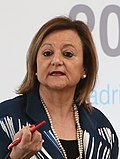| Secretary of State for Foreign Affairs | |
|---|---|
| Secretario de Estado de Asuntos Exteriores | |
 Coat of Arms used by the Government | |
| | |
Incumbent since 20 December 2023Diego Martínez Belío | |
| Ministry of Foreign Affairs Secretariat of State for Foreign Affairs | |
| Style | The Most Excellent (formal) Mr. Secretary of State (informal) |
| Abbreviation | SEAEX |
| Reports to | The Foreign Minister |
| Nominator | The Foreign Minister |
| Appointer | The Monarch |
| Formation | 27 April 1979 |
| First holder | Carlos Robles Piquer |
| Website | exteriores.gob.es |
The secretary of state for foreign and global affairs (SEAEX) is a senior minister of the Ministry of Foreign Affairs, European Union and Cooperation of the Government of Spain. Although he or she has the same rank as the other secretaries of state of the Department, the SEAEX is considered the second-in-command to the minister. [1] [2] [3]
Contents
The secretary of state for foreign affairs is responsible for assisting the minister in the planning of the foreign policy guidelines and its subsequent implementation. It is also responsible for the foreign policy regarding Eastern Europe, Africa, Asia —including the Middle East— and Oceanic countries. [4]
Finally, it also coordinates the foreign policy with respect to international organizations —primarily the United Nations and others related to international security— except for those that fall under the jurisdiction of other secretaries of state. This also includes issues like terrorism, security, and peacekeeping operations, non-proliferation and nuclear disarmament and human rights. [4]









